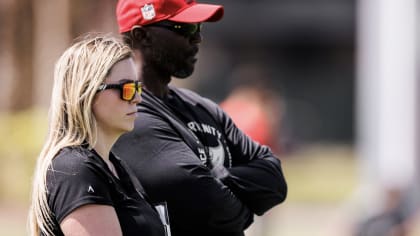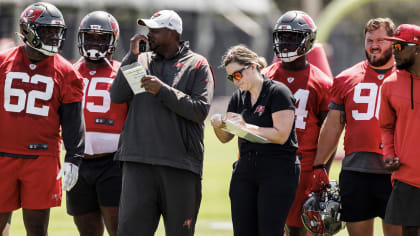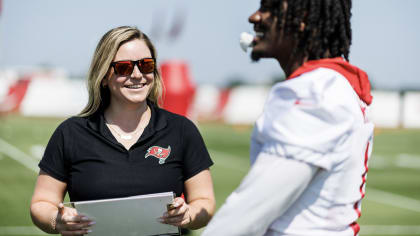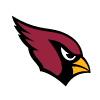Next Woman Up: Sarah Evans, Senior Manager of Coaching Operations for the Tampa Bay Buccaneers
- Next Woman Up: Hannah Gordon
- Charlotte Jones
- Amina Edwards
- Kim Pegula
- Katie Blackburn
- Tina D'Orazio
- Tina Tuggle
- Gayle Benson
- Kim Rometo
- Ashley Lynn
- Karen Murphy
- Amy Sprangers
- Lara Juras
- Megan McLaughlin
- Nadege Pluviose
- Kalen Jackson
- Nancy Meier
- Kelly Kleine
- Mindy Black
- Hayley Elwood
- Sarah Hogan
- Chanelle Smith-Walker
- Gina Newell
- Molly Higgins
- Tiffany Morton
- Maria Rodriguez
- Chloe Janfaza
- Gabrielle Valdez Dow
- Kristi Johnson
- Kelsey Henderson
- Fouzia Madhouni
- Jackie Maldonado
- Stephanie Kolloff O’Neill
- Alexandra Cancio-Bello
- Ashton Washington
- Qiava Martinez
- Remi Famodu-Jackson
- Emily Starkey
- Ciara Burgi
- Robin DeLorenzo
- Marissa Figueroa
- Angela Baker
- Emily Griffin
- Phoebe Schecter
- Alexis Dotson
- Nancy Gold
- Ameena Soliman
- Tameka Rish
- Sarina Soriano
- Maria Gigante
- Ebony Short
- Shelly Harvey
- Sarah Mallepalle
- Maya Ana Callender
- Melainey Lowe
- Donny Brock
- Lacy Ekert
- Sarah Evans
- Darline Llamas Llopis
- Jaemin Cho
- Blayre Holmes Davis
- Michelle Xiao
Women are rising up the ranks throughout professional football, earning positions of power in a space that for too long was ruled almost exclusively by men. We’re seeing more and more women breaking barriers in the sport, but what are the stories beyond the headlines? Who are the women shaping and influencing the NFL today? Answering those questions is the aim of the Next Woman Up series. While the conversational Q&As are edited and condensed for clarity, this is a forum for impactful women to share experiences in their own words. Without further ado, we introduce:
Sarah Evans, Tampa Bay Buccaneers
Position: Senior Manager of Coaching Operations
What started your interest in football and/or working in football?
Like a lot of us in the league, my early childhood and adulthood really revolved around sports. I feel like most of my character, values and morals were built through the experiences that I had on all the different teams that I was on. So I decided to listen to the popular advice that I feel like many of us got: “If you do something you love, you’ll never work a day in your life.” I was at Florida State University, and I was really racking my brain, trying to figure out how I could commit to doing something for the rest of my life. It felt like I had a huge decision to make, and the only thing I really felt confident about was sports. So I studied sports management and we had a great program there with great advisors. I worked my way through a few different internship opportunities, both in college sports and professional sports, and I challenged myself to try a lot of new things to see what really struck me, what I was good at and what I enjoyed the most about sports.
I was really grinding it out in 2015, working for the Miami Marlins full time and also with the Miami Dolphins on game days. After that experience, I knew I wanted to work in the NFL long term, so I started pursuing a full-time role with the Bucs. It didn’t end up working out, but they offered me an internship in the events and entertainment department. I took that, and I went in pretty determined to make the most of that opportunity. I knew that if I did all the right things, I’d be ready when something else opened up. And the persistence paid off. Within a month of my internship, another full-time position opened in my wheelhouse — community relations — and I’ve been here at the Bucs ever since. After eight years and a variety of roles, it’s been awesome for me, really rewarding.
Can you take me through your transition from community relations to your current position?
My first few internships were across so many different departments. I worked in FSU basketball equipment, I worked at a baseball training facility for professional, college and youth players, I worked in the athletics department at Thomas University and then with the Marlins in marketing. I loved seeing the big picture of a team and not just one piece of it. My journey with the Bucs started in events and it was everything that I loved. Then I moved to community relations and thought, Wow, I really love community, because I was exposed to working with the players, their families, the community and staff. It became my passion, supporting all of them through their own football journeys. I then moved to player relations and also started working with more women in football, and I loved that. I wanted to learn more about every single part of the organization and had a passion for that. I kept learning and started to see that I could be an asset for Coach (Todd) Bowles and the coaching staff. I was really impressed with the football operations staff and personnel and the type of team we run here at the Bucs, and that’s when I wanted to do more on the football side.
It’s been such an amazing experience, being able to touch all of those different areas of the organization. I was able to do that through being where my feet were in each moment and time, slowly opening my eyes to more and looking to help others and the team. I think my journey shows the process you have to go through to figure out what you might really enjoy.
For those who might not know, what does your position as senior manager of coaching operations entail?
I report to our head coach, Todd Bowles, and my day-to-day is really trying to assist him and the rest of the coaching staff, along with our supporting departments, on anything that we can do to make the process run as smoothly as possible. We are trying to run a very elite operation here, and there are a lot of people involved and a lot of moving parts. It’s important that everyone is on the same page, so I take pride in really honing in on our communication, our daily processes, how we share information across departments, and ultimately supporting Coach Bowles. I try to take as much off his plate as possible, whether it be in regard to media or community relations, setting up meetings and presentations, helping create the practice shells and dispersing them to the staff, etc. There are a lot of things that come into play each day, and I approach it with the mindset of, How and where can I help the team today?

What does your day-to-day look like during OTAs versus during the season and on game days?
I’ll start with game days because it’s a little more cut and dry. Every game day looks really the same. We begin working by 7 a.m. at the latest — whether we’re at home or on the road — and I am checking in with Coach (Bowles) and then meet him and the rest of our staff at the stadium. I typically like to get to games around three hours ahead of time, and I am kind of the connector between Coach, other staff members and coaches, and players, trying to alleviate some of the stuff on his plate or jump in where I can. I spend the actual game in the booth, listening in on both offense and defense, play-charting and recording what calls are being made on defense in order to help the unit with postgame grades. That’s been a rewarding experience and something new to me that I was able to learn and take on. Then after the game, I am getting together with Coach, figuring out the schedule for the rest of the week and communicating that to the other coaches and staff.
During OTAs, I get the presentation ready for the daily team meeting and sit down with Coach to go over his schedule. He always has a printed schedule of everything going on. Then I’ll join him in his defensive meetings he runs before answering emails and working with the staff to get ready for the day. Once we get on the field, I’m at practice. Off the field, I am at film review, then right back up at my desk getting things ready for the next day. Another big focus for me right now is planning our training camp and regular-season schedules. I look to serve as a liaison between the business and football sides, so a lot of my down time is seeing how I can serve the rest of the organization.
What have you found to be the most rewarding experience in your career?
I would say our Super Bowl win in the 2020 season was insanely rewarding. I think the further away that it gets, the more I cherish it and the more I realize how special it was, especially with the team that we had and the time we were going through (with the COVID-19 pandemic). So, to see all of my coworkers, all of our families, players, everybody put so much hard work and dedication into that, I’m just so proud to be part of that moment in history. I’m just grateful that experience existed for me, because like I said, you realize the further it gets away just how unique it is. So many people are fighting to win a Super Bowl every single year and putting so much of their lives into it, so it was really awesome.
On the flip side of it, what has been the biggest challenge you’ve faced?
I think the most challenging part was that my position (senior manager of coaching operations) was a new role — not only for me but the organization last year. I’d been here for seven years, but I didn’t know all of the staff in the way that I’m able to know them now and work with them now. Getting to build these relationships from the ground up, getting to see what our staff is able to accomplish on a day-to-day basis, and figuring out how to make others’ day or job just a little bit smoother for this team — that’s been a huge challenge, but also what I enjoy the most.

You said you had to take the lead on proving why the organization should have this role. How big a part of your career has advocating for yourself been?
It’s so important. I think it’s really hard to learn. That is something I talk about to a lot of young professionals who reach out to me. I think it really comes down to, if you’re putting in the work, you’re dedicated and you know you’re doing the right things, you have to get comfortable being able to speak to that. It gets easier once you just start doing it. You just have to take control of some of those awkward or uncomfortable moments, think it through, get advice from other people, lean into your network and your community, figure out how they’ve been able to do it and take some of that advice for yourself. As long as you have true values, experience and relationships to fall back on, you’re never going to be in the wrong. But it’s definitely been a journey, and it’s been very necessary. You are always going to be your strongest advocate, but at the same time, I think mentorship is a huge piece, as well. There have been a lot of people advocating for me, and that’s the perfect combination. When you’re able to advocate for yourself and you have other people advocating for you, that comes together to create opportunities. A lot of the time, you might need both.
On that front, do you have any mentors who greatly impacted you?
Yeah, so, obviously, I have to mention Coach Bowles. Working with him on a day-to-day basis, he’s been a life-changing mentor for me. His work ethic and his expertise, it’s shown me what living in your purpose really looks like, like truly opened my eyes to that.
I would also say my first manager at the Bucs, Anna Karefa-Johnson. She was so transparent with me. Really, she changed the course of my career by talking to me about salaries, positions and just the inner workings of the structure and corporate life. She poured into me and told me everything, and that was just so special.
There’s a ton of other people here at the Bucs. Owner Darcie Glazer Kassewitz has pushed me to only deliver the best work at all times, and that’s been amazing. Jason Licht, John Spytek, Mike Greenberg, Jackie Davidson — there’s a really long list of people here who have been great mentors for me. Mentorship is something I’m really passionate about, and I think it’s very crucial for all of our journeys, both professional and personally.
Is there one specific piece of advice that’s stuck with you through the years?
Yeah, I would say what I’m really focusing on right now is, and I’ve always heard people say, “Be yourself.” I feel like I truly have been understanding that concept in the past year. When you’re unique, you can be so valuable to an organization, and being yourself is just your greatest asset. Once you realize that you’re uniquely equipped to have your specific role, that you’ve worked hard for it and done the right things and get to the point that you’re at, then I think you can reach your full potential.

Have you noticed any industry changes in terms of women in sports since you started your career?
In my opinion, even just looking at the Next Woman Up features, there are so many women who have been in football and sports for a long time. This isn’t necessarily a new concept of women in football, but what I think has changed is the support of it. It’s more widely known now, and it definitely is more accepted and there’s more access. But it’s nice to see women being celebrated and promoted and just more visible in the space. I have seen changes not only in our building, but in the league since I started just eight years ago. Watching our ownership, they’re constantly raising the bar to promote women in football, both internally and externally, so that’s been amazing to see. I really believe in that saying, “If you can see her, you can be her,” and I think that’s true for everyone. Platforms like this are going to allow so many more women to see something is possible, like, “That’s a job. I’m going to go for that!” Sometimes you just don’t know those jobs existed. I didn’t know they did when I was in college; I didn’t realize all these different positions were behind these doors. The visibility is the biggest takeaway for me.
Lastly, is there anything I haven’t asked that you want to highlight?
Everybody’s journey is not the same, and the more people I meet across the league, we’ve all come from different backgrounds, different departments. There are no limitations. Being here for eight years, working with marketing, community relations, player relations and now coaching operations, I feel like the message really is to just go for it. If you put the work in, anything is possible.


